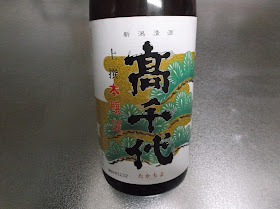One big characteristic of Japanese sake (nihonshu in Japanese) is that it can be drunk in a wide temperature range of about 5-55 oC.
Note: In Japanese, sake or o-sake (politer) is a generic term for any type of alcoholic beverage. To refer to Japanese rice wine, you need to use a more specific term like nihonshu (lit. Japanese sake) or seishu (lit. refined sake).
I personally like to have my sake (beer, shochu, and Japanese rice wine) well chilled. Recently, I found some sites that recommend having Japanese rice wine at hitohada (lit. human skin temperature), that is, around 35-37 oC. The reason for this is that the sweetness is at its peak at hitohada whereas the sourness remains the same regardless of the temperature, and nihonshu at hitohada has a good balance of sweetness and sourness.
So, I made a little expriment tonight. For this experiment, I used Takachiyo Honjozo from Takachiyo Shuzo, located in the Shiozawa area of Minami-Uonuma city.
日本酒の大きな特徴の一つは、約5~55度という幅広い温度範囲で飲めるという点です。
注: 日本語では、酒またはお酒(より丁寧)とは色々なアルコール飲料の総称です。Japanese rice wineを指すには、日本酒とか清酒とか、もっと特定の用語を使う必要があります。
私自身はお酒(ビール、焼酎、日本酒)をよく冷やすのが好きです。最近、人肌、つまり35~37度程度の日本酒を飲むことを勧めるサイトをいくつか見つけました。理由は、甘さは人肌で最高になる一方、酸度は温度に係わらず同じで、人肌の日本酒は甘さと酸度のバランスがいいからだそうです。
というわけで、今夜はちょっとした実験をしました。この実験には、南魚沼市の塩沢地域にある高千代酒造の高千代本醸造を使いました。
電子レンジでお酒の温度を上げました。
Hm........, I still prefer my sake well chilled.
うーーん、やはりよく冷やしたお酒のほうが好きです。


Very interesting. I am quite ignorant about sake (I think I drank good sake only once in my life), but I have always preferred it cold. I also prefer it drier.
ReplyDeleteCold wines in Europe are advised to be drunk colder than dry wines, so it's very interesting (of course rice wine is not the same...).
Sissi: And, I'm ignorant about wine!
ReplyDeleteAs you may know, Tsuji's book has a section on sake. You can learn a great deal from it, but note that the grade (tokkyu, ikkyu, and nikyu) system was abolished long ago. As for sake, learning by doing is the way to go, don't you think? (laugh)
Thank you for the advice. I will read once more about sake in Tsuji's book before going to Japan.
ReplyDeleteI agree about the learning method: it applies to grape wine too! I shall practice maybe next time I go to Japan (last time I drank only shochu; I knew at least I would appreciate it a bit... since I practiced drinking shochu here!).